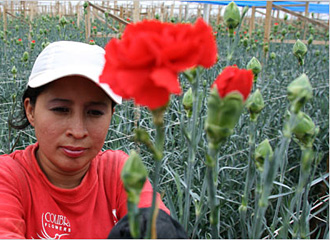
|
 |
 |
 Editorials | Opinions | April 2008 Editorials | Opinions | April 2008  
Better Roses Than Cocaine
 Nicholas D. Kristof - NYTimes Nicholas D. Kristof - NYTimes
go to original


| | Norma Reynosa clips flowers outside Bogota. (Nicholas D. Kristof/The New York Times) | | |
Bogotá, Colombia - For seven years, Democrats have rightfully complained that President Bush has gratuitously antagonized the world, exasperating our allies and eroding America’s standing and influence.

But now the Democrats are doing the same thing on trade. In Latin America, it is Barack Obama and Hillary Clinton who are seen as the go-it-alone cowboys, by opposing the United States’ free-trade agreement with Colombia.

Some Democrats claim that they are against the pact because Colombia has abused human rights. Those concerns are legitimate — but they shouldn’t be used to punish people like Norma Reynosa, a 35-year-old woman who just may snip the flowers that go into the Mother’s Day bouquet that you buy.

Human rights aren’t abstract to Ms. Reynosa. Two of her relatives were killed in the brutal warfare and insecurity that plague her home region in Colombia’s South. A third was killed by a land mine, and a fourth was kidnapped at age 12 to work for guerrillas in the National Liberation Army, or the ELN. Ms. Reynosa ran a small restaurant but had to flee when the guerrillas demanded that she pay more extortion money than she could afford.

“They said they would kill us,” she recalled. “They didn’t say how. Mostly they just shot people and threw their bodies in the river.”

So in June 2005, Ms. Reynosa and her husband abandoned their home and fled to the outskirts of the capital to see if they could get jobs in the booming flower industry. Colombian cities like Medellín were the most dangerous cities in the world in the 1980s and ’90s, but now they are thriving and homicide rates are well below those of some American cities.

One reason is those bouquets you buy, entering duty-free from Colombia. These days Colombia is the world’s second-largest exporter of flowers after the Netherlands, and almost 200,000 people work in the flower industry. Up to 28 cargo planes a day carry flowers from Colombia to the U.S.

Better carnations than cocaine, no?

Critics of the free-trade pact worry that it would hurt American workers. But Colombian goods already enter the U.S. duty-free; what would change is that American exporters would get access to the Colombian market.

(Colombia is pushing hard for the pact not because of any immediate trade benefit but because its duty-free access to the U.S. must be regularly renewed. Businesses are reluctant to invest in flower farms or garment factories unless they know that they will be able to export to the U.S. for many years to come.)

Some Democrats point out that Colombia’s government has been tied to paramilitary units that kill union members. It was important for Democrats to raise these concerns — forcing the Colombian government to crack down on paramilitaries and prosecute those who murder unionists.

But Colombia’s progress has been immense. Assassinations of union members, while still a problem, have fallen 80 percent since 2002. Last year, the murder rate for union members was 4 per 100,000, reaching levels far below the homicide rate for the general public.

As she clips flowers in a vast greenhouse, Ms. Reynosa knows that her future depends on access to the American market. She agrees that Colombia has human-rights problems, but she argues passionately that the free-trade agreement is the way to register continued improvements. More trade will mean more jobs and more security and human rights, she argues.

The last few years have seen enormous gains in security and the quality of life in Colombia — and that’s why President Álvaro Uribe has an 85 percent approval rating.

I asked President Uribe on Monday if there was concern among Latin leaders that Democrats in Congress are tugging the U.S. away from its historic commitment to free trade. He said bluntly: “I don’t want to imagine this scenario. It would be devastating for the good relationship between the United States and our region.”

To their credit, a large group of prominent Democrats from previous administrations have strongly endorsed the trade accord, declaring that it is “in both our vital national security and economic interests.” But the presidential candidates aren’t listening.

Democrats instinctively criticize Mr. Bush when he harms America’s standing in the world. That’s easy. But a test of intellectual honesty is your willingness to hold your own side to the same standard and to point out pandering in those politicians you normally admire.

One of President Bush’s most costly actions was his flat rejection of the Kyoto climate treaty; it symbolized a my-way-or-the-highway approach that bolstered anti-Americanism around the world. If the Colombia free-trade pact is rejected and the U.S. backs away from its commitment to expanding trade, that may be the Democrats’ equivalent of Kyoto, signaling a retreat from internationalism.

It would be seen as the United States thumbing its nose at the world.

I invite you to comment on this column on my blog, www.nytimes.com/ontheground, and join me on Facebook at www.facebook.com/kristof. | 
 | |
 |



